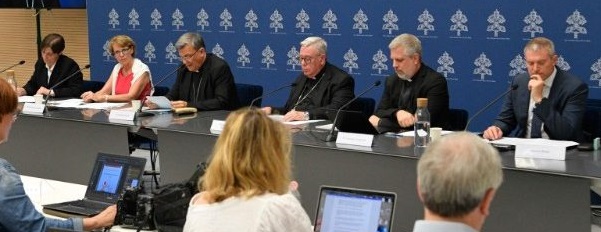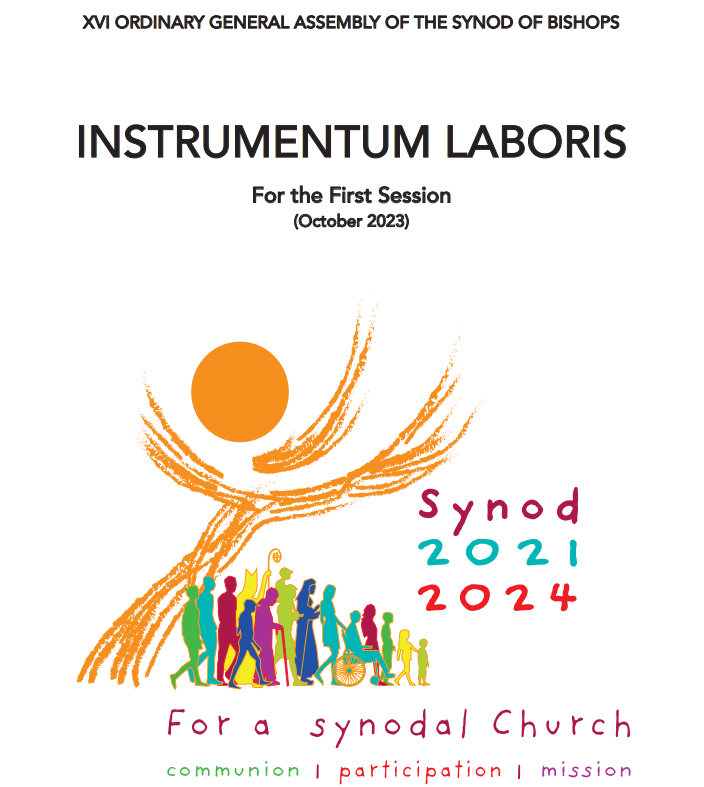(The information below is adapted from the article Vatican releases Synod document calling for discussion of women, LGBT Catholics, church authority and more -America Magazine. Links to the complete Instrumentum laboris document and the FAQ and Executive Summary can be found at the end of this post and on our website: sjspwellesley.org/synod/)

On June 20, the secretariat for the synod published the working document (known by its Latin title instrumentum laboris) for the first session of the General Assembly of the Synod of Bishops on synodality that will be held in the Vatican from October 4 to October 29, 2023. The second session will be held in October 2024.
The 50-page text was presented at a press conference in the Vatican by Cardinals Mario Grech and Jean Claude Hollerich S.J., secretary general and relator general of the upcoming synod, respectively, and Father Giacomo Costa, S.J., the consultor of the synod’s secretary general.
Cardinal Grech described the working document as “the fruit of a synodal process” that started on Oct. 10, 2021, and “involved the whole church” in an exercise of listening to the people of God. The first phase was articulated in three stages: at the local churches with consultation of the people of God (clergy and laity); at the bishops’ conferences, which engaged in a discernment process about the input from the local churches; and at the continental levels, where input from around the world was synthesized.
Unlike the working documents for past synods, which were intended to be amended, improved and voted upon, this document is designed as “a practical aid for the conduct” of the October assembly at which there will be more than 350 participants (including laymen and around 45 women, both lay and consecrated), not a text to be amended.
The document states that it “is not a document of the Church’s Magisterium, nor is it the report of a sociological survey; it does not offer the formulation of operational indications, goals and objectives, nor a full elaboration of a theological vision.” It is “part of an unfinished process.” It draws on but also goes beyond the insights of the first phase and articulates “some of the priorities that emerged from listening to the People of God, but avoids presenting them as assertions or stances. Instead, it expresses them as questions addressed to the synodal assembly,” which “will have the task of discerning the concrete steps which enable the continued growth of a synodal church, steps that it will then submit to the Holy Father.”
It says the synodal journey so far has revealed the existence of “shared questions” and “part of the challenge of synodality is to discern the level at which it is most appropriate to address each question.” That same journey also showed there are shared tensions in the church, but, the document says, “we should not be frightened of them, nor attempt at any cost to resolve them, but rather engage in ongoing synodal discernment” so that these tensions can “become sources of energy and not lapse into destructive polarizations.”
At the press conference, Cardinal Grech said “one of the discoveries” on the synodal journey that started on Oct. 10, 2021, was the method of “conversation in the Spirit,” which will now be used in the October synod.
Father Costa described this method as “shared prayer in view of a common discernment, by which participants prepare themselves through personal reflection and prayer” before the discussion. He said this method “opens ‘spaces’ in which to face together controversial subjects, around which in both society and in the church there are often clashes and confrontation, in person or through social media.” The consultation phase has shown how this method offers “a practical alternative to polarization in the church,” Father Costa said.
 The many questions raised around the world that are recognized in the document relate to the role of women in the church (including the women’s diaconate), the ways of exercising authority in the church at all levels including the papacy, ecumenical and interreligious relations, the need for a new language in church communication, the need for renewal of the formation in the seminary, the question of the ordination of mature married men in some regions, the approach to the divorced and remarried Catholics and to L.G.B.T. people, the preferential option for the poor, the preferential option for young people, the care of our common home and much more.
The many questions raised around the world that are recognized in the document relate to the role of women in the church (including the women’s diaconate), the ways of exercising authority in the church at all levels including the papacy, ecumenical and interreligious relations, the need for a new language in church communication, the need for renewal of the formation in the seminary, the question of the ordination of mature married men in some regions, the approach to the divorced and remarried Catholics and to L.G.B.T. people, the preferential option for the poor, the preferential option for young people, the care of our common home and much more.
Click here for the full article on the America website
Click here to read the working document Instrumentum laboris on our website
Click here to read the FAQ and Executive Summary on our website
